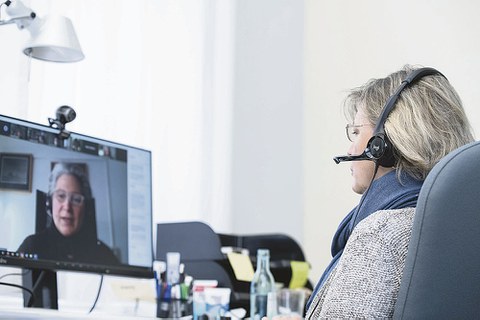Feb 02, 2021
powerful and ethical to the future

The future lab in virtual rooms
Magdalena Selbig
The combination of participation and reception made the online Future Lab "How do we want to do research?" a great success. A seamless technology concept beamed 187 participants from one virtual room to the next, enabling them to share their experiences on specific topics and their creative ideas. Following a greeting by the Rector Prof. Ursula M. Staudinger, the event manager Prof. Angela Rösen-Wolff outlined the strategic goal in research: increased interdisciplinarity, a stronger connection with the Medical Campus, the Faculty of Arts, Humanities and Social Sciences as well as the DRESDEN-concept partners, and a higher number of excellent Clusters. After a brief discussion with the participants, the help desk assigned everyone to their chosen thematic groups.
"Research ethics" with Prof. Gerhard Rödel (Chair of Genetics) and Dr. Katrin Jordan (Head of Directorate 5) discussed the establishment of a commission for responsible research and the handling of research freedom and risks. The discourse also revealed a need for discussion platforms with higher degree of transparency. Involving TUD's responsibility would be essential, since violations of ethical principles are detrimental to the institution as a whole.
In their keynote speech for the thematic group "Good scientific practice", Dr. Barbara Könczöl (Head of the Graduate Academy) and Prof. Christel Baier (Chair of Algebraic and Logical Foundations of Computer Science; TU Dresden Ombudsperson) outlined the DFG Code guidelines, which have been tightened in 2019. During the discussion, possible content for courses were substantiated: The added value resulting from infringements was considered to be a problem. Prof. Daniel Leising (Chair of Assessment and Intervention): "To counteract this, we need independent authorities allowed to impose sanctions which people are definitely afraid of." Prof. Dominik Schrage (Chair of Sociological Theories and Cultural Sociology) highlighted the internal perspective: "Instead of a normative 'you are not allowed to do that', the impulses and situations of these individuals need to be reflected upon in order to develop approaches to solutions." In conclusion, there was a desire for a visible format to educate about the culture of good scientific practice.
"Research data management" was the highest priority for CDIO Prof. Lars Bernard and Dr. Ralph Müller-Pfefferkorn (Head of the Department of Distributed and Data Intensive Computing at the ZIH). In order to use the collected data productively, legal issues need to be clarified in subject-specific teaching and consulting. In particular, the participants from the DRESDEN-concept partner institutions expressed their interest in forming an overarching analysis group.
DRESDEN-concept partners were also attracted by the thematic group "Open Science". Due to the great demand, this offer was quickly multiplicated: in addition to Prof. Stefan Scherbaum (Open Science Initiative of the Faculty of Psychology) and Dr. Julia Meyer (Knowledge Manager for the School of Humanities and Social Sciences at the SLUB), Dr. Andreas von der Dunk (Research Data Management at the SLUB) and Dr. Denise Dörfel (Chair of Differential and Personality Psychology) ensured that this thematic group could be held six times. The heterogeneous knowledge about Open Science that was evident in the audience was remarkable. "We need to have a central point of contact for Open Science that also provides training," Prof. Scherbaum concluded. A lively discussion followed: "We need society to make our research data relevant. At the same time, it takes vague data off our hands," said Prof. Thomas Köhler from the Media Center. This gave rise to ideas about own publishing houses in cooperation with the SLUB and about an active discourse with the public. All of the discussion groups expressed the need for services which support the qualification and quality assurance for working with Open Science.
The thematic group on TUD's research information system had an informative character. Prof. Friedrich Funke (Chair of Education/Quantitative Research Methods) and Dr. Anita Sbalzarini (Head of the Unit Research Information) presented the PURE database. The focus was on the technical needs of the audience - the transfer of existing data and access for administrative staff. Inquiries about the data protection of the commercial system and its mandatory use reflected an ambivalent consensus. Integrating the external partners into the FIS was another impulse.
In the thematic group on "Performance-based funding allocation", led by Prof. Stefan R. Bornstein (Director of the Medical Clinic and Polyclinic III and of the Center for Internal Medicine) and Dr. Sacha Hanig (Head of the Unit Research Promotion), it became apparent that the heterogeneity of specialist disciplines makes it difficult to unite players on an equal footing using a single benchmark. "If we want to be global, it pays to use the indicators of global universities. In the UK, often the quality of only five publications is assessed," Dr. Hanig explained about the assessment parameters.
The event's quintessence was to develop opportunities for trustful conversation and their visibility. Prof. Angela Rösen-Wolff delivered the closing remarks: "From your impulses, we will develop measures that will move us all forward. It will be a challenge, but it will be worth it. It is the only way we can progress. I consider this day a great success."
